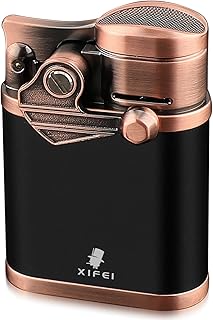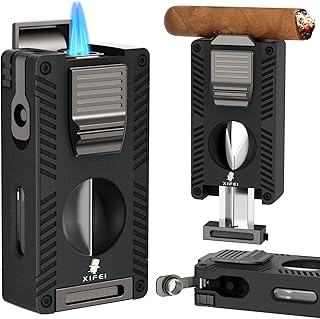XIFEI Lighter: Durability and Performance Test
Introduction:
This document outlines a comprehensive test protocol for assessing the durability and performance of a XIFEI lighter. The goal is to evaluate its functionality, reliability, and resistance to various factors that can affect its lifespan.
Test Objectives:
* Functionality: Evaluate the lighter's ability to consistently produce a flame and ignite various fuels.
* Durability: Assess the lighter's resistance to impacts, drops, and environmental conditions.
* Performance: Determine the lighter's flame intensity, burning time, and fuel efficiency.
* Reliability: Evaluate the lighter's consistency over multiple uses and its resistance to malfunctions.
Test Methodology:
1. Functionality Tests:
* Flame Ignition: Test the lighter's ability to ignite a flame with different types of fuel (butane, propane, etc.). Observe the flame's color, stability, and size.
* Ignition Reliability: Perform 100 consecutive ignition attempts and record any failures or inconsistencies.
* Fuel Filling: Evaluate the ease of filling the lighter with fuel and the filling process's effectiveness.
* Fuel Leakage: Observe any fuel leakage during storage, handling, or use.
2. Durability Tests:
* Impact Resistance: Drop the lighter from different heights (1 meter, 2 meters) onto a hard surface. Assess any damage to the lighter's casing, mechanism, or functionality.
* Drop Test: Drop the lighter onto various surfaces (concrete, gravel, wood) from a height of 1 meter. Evaluate any damage or functionality loss.
* Water Resistance: Submerge the lighter in water for a specified duration (e.g., 30 minutes). Assess any water ingress and functionality issues.
* Temperature Resistance: Expose the lighter to extreme temperatures (high and low) for a specified duration. Evaluate any damage to the lighter's materials or functionality.
3. Performance Tests:
* Flame Intensity: Measure the flame's height and temperature using a calibrated device.
* Burning Time: Determine the lighter's continuous burning time on a full tank of fuel.
* Fuel Efficiency: Calculate the lighter's fuel consumption rate based on the burning time and the amount of fuel used.
4. Reliability Tests:
* Long-Term Use: Test the lighter for a specified period (e.g., 1 month) with regular use (multiple ignites daily). Observe any changes in functionality, performance, or durability.
* Malfunction Analysis: Record any malfunctions, failures, or inconsistencies that occur during the tests.
Test Equipment:
* Calibrated thermometer
* Fuel types (butane, propane)
* Measuring tape
* Stopwatch
* Scale
* Water tank
* Temperature-controlled chambers
* Impact testing equipment
Data Analysis and Reporting:
* Record all test data meticulously and analyze the results.
* Create a detailed report summarizing the lighter's performance, durability, and reliability.
* Highlight any strengths and weaknesses of the XIFEI lighter based on the test findings.
* Provide recommendations for improvements or modifications to enhance the product's overall quality.
Conclusion:
This comprehensive test protocol aims to provide a comprehensive evaluation of the XIFEI lighter's performance, durability, and reliability. The results will assist in identifying areas for improvement and contribute to the development of a high-quality and reliable lighter for consumers.


